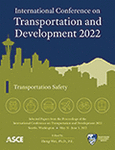How to Collect Tribal Crash Data Properly? Experience from a New Wisconsin Crash Reporting System
Publication: International Conference on Transportation and Development 2022
ABSTRACT
Developing effective transportation safety programs for tribal lands is important due to higher crash rates and crash severities in those areas. Correspondingly, a comprehensive tribal crash reporting and crash data quality are imperative to analyze and identify high crash locations and to develop and fund effective tribal safety programs. This study presents quantitative and spatial data analyses to validate the effectiveness of tribal crash data elements on the Wisconsin police crash report with respect to three attributes: location, jurisdiction, and law enforcement agency. The results indicate that these tribal attributes are coupled with other standard location attributes, which negatively affects data quality for further analysis. The findings recommend that adding an independent subfield in the national standard crash classification for tribal elements and adding a specific tribal road type to the roadway data elements would be more effective for tribal crash reporting and analysis, which facilitates further safety analysis regarding all roadway types within tribal lands.
Get full access to this article
View all available purchase options and get full access to this chapter.
REFERENCES
Bailey, L., and Huft, D. (2008). “Improving crash reporting: study of crash reporting practice on nine Indian reservations.” Transp. Res. Rec., 2078(1), 72–79.
Chen, T., Shi, H., Vorhes, G., Parker, S. T., and Noyce, D. A. (2020). “Data and System Architecture Improvements for Statewide Crash Mapping and Analysis.” Presented at 99rd Annual Meeting of the Transportation Research Board, TRB, Washington, D.C.
FHWA (Federal Highway Administration). (2022). “Tribal Transportation Program Safety Fund (TTPSF).” <https://flh.fhwa.dot.gov/programs/ttp/safety/ttpsf.htm>(Jan. 22, 2022).
Horan, T., Hilton, B., Robertson, J., and Mbugua, J. (2018). Using GIS to Improve Tribal Safety: Applications, Trends, and Implementation Dimensions. Center for Transportation Studies, University of Minnesota. Minneapolis, MN.
James, E., and Russo, B. J. (2019). “Analysis of factors affecting injury severity in traffic crashes on Arizona tribal lands.” Transp. Res. Rec., 2673(9), 345–354.
NHTSA (National Highway Traffic Safety Administration). (2017). “Model Minimum Uniform Crash Criteria – 5th Edition.” <https://www.nhtsa.gov/mmucc-1> (Jan. 22, 2022).
Noyce, D. A., Li, Z., Chesnik, Z. K., Macy, A., and Qin, X. (2014). Guide for effective tribal crash reporting. The National Academies Press. Washington, DC.
Opus International Consultants, and Ceifetz, A. H. (2012). Crashes on Wisconsin Indian Reservations: Reporting, Conclusions, and Recommendations. Wisconsin Department of Transportation. Madison, WI.
Parker, S. T., and Tao, Y. (2006). “WisTransPortal: A Wisconsin Traffic Operations Data Hub.” Procedings., Applications of Advanced Technology in Transportation, ASCE, Reston, VA, pp. 611–616.
Redinger, C., Woods, M., Bagdade, J. S., and Bowman, N. (2012). Improving Crash Reporting on Wisconsin Indian Reservations. Phase I: Review of Crash Reporting Procedures. Wisconsin Department of Transportation. Madison, WI.
Shinstine, D. S., and Ksaibati, K. (2013). “Indian reservation safety improvement program: A methodology and case study.” Transp. Res. Rec., 2364(1), 80–89.
State of Wisconsin Department of Transportation. (2022a). “Highway Safety Improvement Program (HSIP).” <https://wisconsindot.gov/Pages/doing-bus/local-gov/astnce-pgms/highway/hsip.aspx>(Jan. 22, 2022).
State of Wisconsin Department of Transportation. (2022b). “TraCS.” <https://wisconsindot.gov/Pages/safety/enforcement/agencies/tracs/default.aspx>(Jan. 22, 2022).
United States Census Bureau. (2022). “Cartographic Boundary Files.” <https://www.census.gov/geographies/mapping-files/time-series/geo/carto-boundary-file.html> (Jan. 22, 2022).
US EPA. (2022). “Definition of Indian Country.” <https://www.epa.gov/pesticide-applicator-certification-indian-country/definition-indian-country> (Jan. 22, 2022).
US DOT. (2022). “Traffic Records Coordinating Committee.” <https://www.transportation.gov/trcc>(Jan. 22, 2022).
US Department of the Interior Indian Affairs. (2022). “Indian Highway Safety Program.” <https://www.bia.gov/bia/ojs/dhs>(Jan. 22, 2022).
Information & Authors
Information
Published In
History
Published online: Aug 31, 2022
Authors
Metrics & Citations
Metrics
Citations
Download citation
If you have the appropriate software installed, you can download article citation data to the citation manager of your choice. Simply select your manager software from the list below and click Download.
